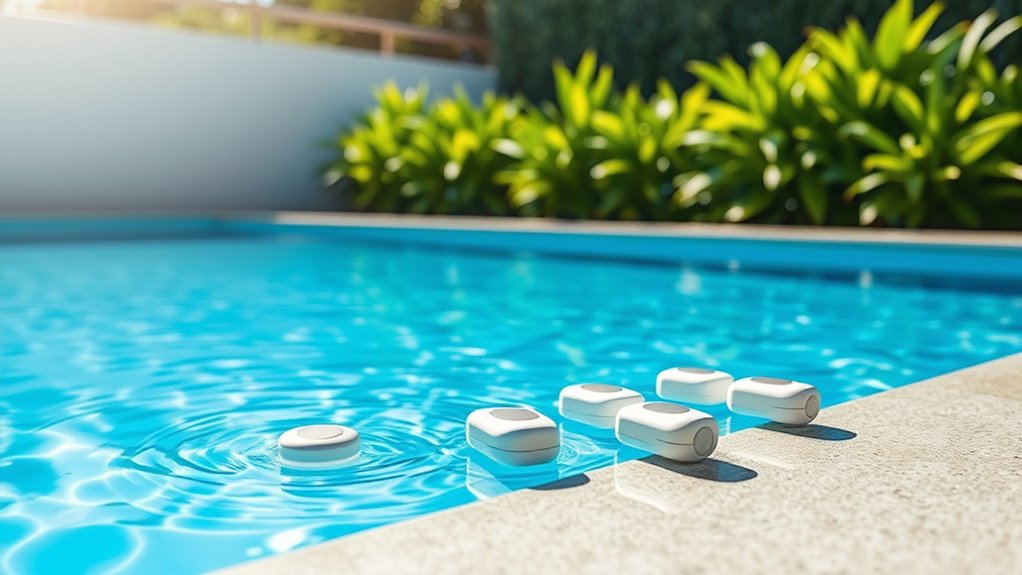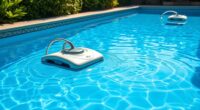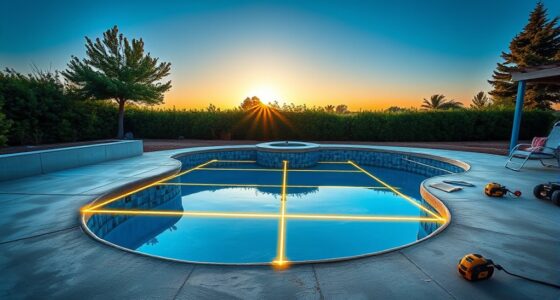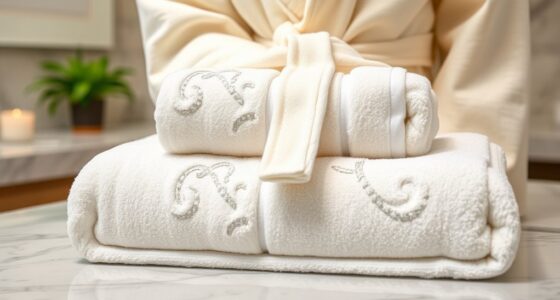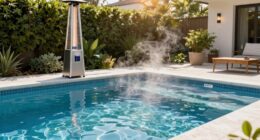Pool water sensors are revolutionizing how you monitor water quality. With real-time insights, you can track essential parameters like chlorine, pH, and alkalinity easily. These advanced sensors use optical and ultrasonic technology for accurate measurements and wireless data transmission for convenience. You’ll get alerts on imbalances, helping you act quickly. Plus, mobile app integration makes managing your pool a breeze. Discover how these innovations can enhance your pool experience even further.
Key Takeaways
- Advanced pool water sensors utilize optical and ultrasonic technology for precise monitoring of water quality and levels.
- Real-time monitoring of key parameters like free chlorine, pH, and alkalinity ensures safe swimming conditions and prevents disease spread.
- Mobile app integration allows for remote monitoring, alerts on chemical imbalances, and automated adjustments for optimal pool management.
- Continuous advancements in sensor accuracy and sustainable technologies promise improved performance and reduced environmental impact.
- Future developments aim to enhance durability and efficiency, extending equipment life and ensuring better reliability for pool maintenance.
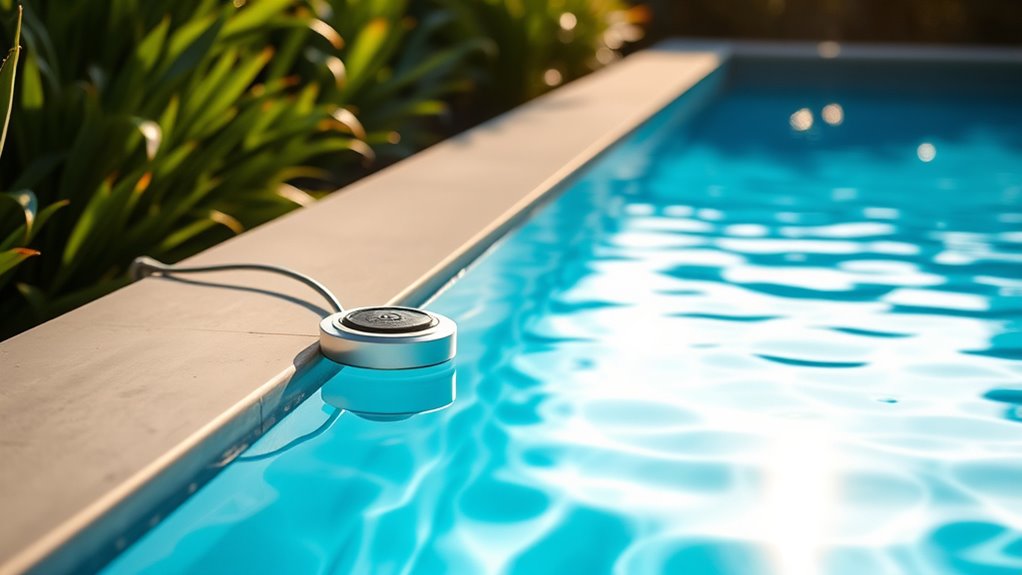
When you plunge into your pool, guaranteeing the water is safe and clean shouldn’t be a worry. Thanks to advanced technology, pool water sensors have revolutionized how you maintain your swimming environment. These sensors offer real-time insights into water quality, allowing you to enjoy your pool without the nagging fear of contamination.
Optical sensors, using infrared or laser beams, can effectively detect water levels and quality. Devices like the WaterGuru SENSE utilize patented optical technology to monitor key parameters such as Free Chlorine (FC) and pH daily. This advanced monitoring system means you don’t have to guess anymore; you’ll know exactly what your water needs. Wireless data transmission further allows for real-time monitoring, meaning you can keep track of your pool’s health from anywhere.
You might also encounter ultrasonic sensors, which measure water levels by calculating sound wave travel times. These are commonly used in storage tanks, but their principle can be applied to pools too. In addition, pressure transducers and float switches serve essential roles in various water systems, guaranteeing everything runs smoothly.
Key parameters monitored by these sensors include pH levels, total alkalinity, cyanuric acid, and calcium hardness. Keeping these in check prevents disease spread and guarantees the water is safe for swimmers. Real-time monitoring not only enhances filtration but also provides customized advice tailored to your specific pool needs. As a result, you can enjoy a clean swimming experience while reducing maintenance costs.
The integration of mobile apps into these systems means you can control and monitor your pool conditions remotely. This level of convenience allows you to receive alerts about imbalances in pool chemistry, empowering you to take immediate action. The automation features can even make adjustments to your pool systems without you having to lift a finger.
Experience seamless pool management with mobile app integration, allowing real-time monitoring and automated adjustments for optimal water quality.
As these technologies continue to evolve, expect to see new materials enhancing sensor accuracy and durability. Sustainable technologies are also on the horizon, focusing on reducing environmental impacts while maintaining peak water quality.
With sensors improving efficiency and extending equipment life, you can feel confident that your pool remains a safe haven for relaxation and enjoyment. Embrace these innovations, and your swimming experience will be more enjoyable than ever.
Frequently Asked Questions
How Do Pool Water Sensors Work in Different Weather Conditions?
Pool water sensors work by monitoring water levels and quality, adjusting automatically in different weather conditions.
In hot weather, they manage evaporation by activating pumps to maintain ideal levels. During heavy rainfall, they handle excess water, often triggering drainage systems.
Additionally, sensors protect against freezing temperatures by circulating water. They also account for wind-induced water loss, ensuring your pool remains safe and well-maintained, regardless of the weather.
Can Pool Water Sensors Detect Chemical Imbalances?
Did you know that 80% of pool owners struggle with chemical imbalances?
Fortunately, pool water sensors can detect these imbalances in real-time. They continuously monitor critical parameters like pH and chlorine levels, alerting you when conditions deviate from the ideal range.
This sensitivity allows you to make timely adjustments, ensuring your pool remains safe and enjoyable. By using these sensors, you can take the guesswork out of pool maintenance.
What Is the Average Lifespan of a Pool Water Sensor?
The average lifespan of a pool water sensor usually ranges from 3 to 7 years, depending on various factors.
You need to take into account environmental conditions, maintenance practices, and the quality of the sensor.
Regular cleaning and calibration can greatly extend its life.
If you invest in high-quality sensors and monitor their usage, you’ll likely get the most out of them, ensuring your pool remains safe and enjoyable for swimming.
Are Pool Water Sensors Compatible With All Pool Types?
Imagine effortlessly monitoring your pool’s health, regardless of its type.
Yes, pool water sensors are generally compatible with various pool types, whether you’ve got a cozy vinyl setup or a grand concrete oasis.
They adapt to different materials and sizes, ensuring you can keep track of essential parameters like pH and chlorine.
How Do I Maintain My Pool Water Sensor for Optimal Performance?
To maintain your pool water sensor for peak performance, regularly clean it with sensor-specific solutions and soft brushes.
Inspect it often to catch any damage early. Keep up with calibration according to the manufacturer’s schedule, especially after maintenance.
Store your sensor properly during winterization, ensuring it’s in water or a storage solution.
Finally, choose compatible pool chemicals and consider environmental factors that might affect its performance for longevity.
Conclusion
Just like a vigilant lifeguard keeping a watchful eye on swimmers, pool water sensors stand guard over your oasis. They guarantee that every splash and dive happens in safe, crystal-clear waters. Embracing these technological advancements not only protects your pool’s beauty but also safeguards the joy of every swimmer. So, let these sensors be your trusty companions, guiding you toward a worry-free swim, while you focus on making cherished memories under the sun.
